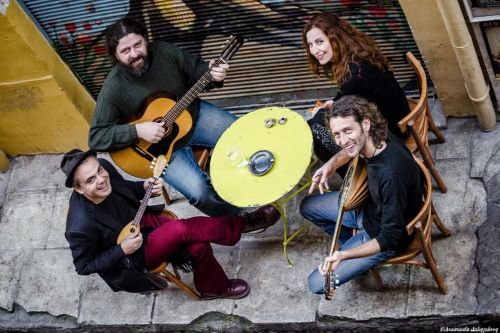'pliri daxi' are called the “Successors of Greek popular musical tradition” through their own creation, by 'Le grand tour - La Grèce', a French documentary in which they interpret and, among other things, comment on the social context of their song 'Ta Daneia' (The Loans). This participation is also the spark that created the musical performance 'le rebétiko aujourd’hui - société et réalité'. Old songs and songs by 'pliri daxi', the main theme always being social reality (human relationships, employment, social exclusion, immigration, the financial and humanitarian crisis, etc.), compose this unique performance.
Those who believe that a rembetiko ensemble might nowadays be passé or for those who wonder what role rembetiko could have on the Greek music scene of the present, need only attend one 'pliri daxi' live gig to get their answers. Their audience can immediately tell that this is a modern and very promising ensemble, which does a respectful service to rembetiko and stands out for its dynamic instrumental technique and vocal lyricism. An ensemble that achieves a replication of the timbre of the time mainly before the German occupation with such ease, that it takes you on a journey through time.
Unravelling the thread of their common musical journey, their beginnings can be traced back to March 2012 in Thessaloniki, when they were formed after the initiative of Lefteris Tsikouridis (bouzouki, vocals). The musical ensemble is completed by Katerina Douka (vocals, zill, spoons), Manolis Porfirakis (guitar, vocals) and Christos Pappas (bouzouki, baglamas, vocals). All of them have a significant musical background, which is varied, making their coexistence all the more charming and the musical result even more interesting. Lefteris Tsikouridis studied the classical violin, he teaches Specialisation in the Three-String Bouzouki at University of Macedonia and Rembetiko Music Ensemble, while he is also a member in Greek bands 'Skagb', 'Paranaue' and 'Strada Rebetico' in Canada. Christos Pappas also had classical training in music (diploma in Bassoon and Composition), he has worked with 'Broken Seals', Dinos Sadikis, 'Boomstate' and Dimitris Baslam, as well as with the XSOMA and SINEQUANON dance teams. Manolis Porfirakis studied the piano, sound engineering and Byzantine music, and has worked with Agathonas and Dimitris Mystakidis. Katerina Douka is a dedicated fan of traditional music (with significant collaborations on records: 'Iliovasilema ston Evro' -Sunset on Evros-, 'Evros', 'Apopse'-This Evening), while she first came into contact with rembetiko in 2007. As far as their name is concerned, those who are more familiar with rembetiko may recognise it as a “loan” from the old rembetiko instrumental melody from 'O Stavrakas mes'ton teke' (Stavrakas in the drug den) by Spyros Peristeris.
Over their four years of activity they have already produced three albums ('pliri daxi' – 2013, 'APOSTOLI STO DIASTIMA' – MISSION TO SPACE – 2014, and 'Tritos DISKOS' – Third RECORD' – 2015) and they have established a way of expression and performance that is based on traditional styles, as they were recorded by the discography in the interwar period. It is no coincidence that their repertoire was influenced by three main factors from the very beginning. The first factor was the expression and execution of songs and instrumental melodies that originate in the rich popular musical tradition and in rembetiko, as it was recorded during the first major discography era of the 1910s, '20s and '30s, mainly in Greece and the USA, as well as in Turkey. The second factor concerns the composition of the ensemble itself (four voices, bouzouki, pop guitar and baglama), which is the standard set up for a popular ensemble. Such ensembles first appeared in the '30s and created, based on traditional forms of composition, their own music. The third and equally important factor, is the research and use of specific techniques in expression, interpretation and execution, coming mainly from traditional styles [voice timbre, holding the drone, specific tuning (douzeni), etc.].
For all these reasons and all the reasons those of you who had the opportunity of enjoying their music at this year's Dimitria discovered, we vote... 'le rebétiko aujourd’hui'.
Athonos Square (Intersection of Vatikioti Street and Dimitsa Street), 12:00




















































































